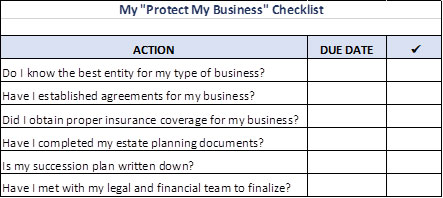
Overview
If you are the owner of a small or medium-size business, succession planning is critical to its ongoing success in the event of unplanned emergency or death. Our extensive business backgrounds allow us to share our knowledge to assist you in developing a roadmap for your business.
Business Start-Up and Incorporation
Our team has extensive experience to help you form a corporation or LLC, act as a registered agent, and help with the initial documents to get your business venture started.
Document Drafting & Review
As a small business owner, contracts and agreements are a standard part of operating. Retaining in-house or outside legal counsel can be expensive. At DSM Law, we take on the role of your legal counsel on an as-needed basis only. Contact us when you need us to review a document, draft a contract or guide you in selling or acquiring a business.
Business Succession
All business owners should develop a succession plan. Questions to consider when writing the plan include:
- What would happen if I was unable to come to work for an extended period of time?
- Who would meet the payroll, pay taxes and execute contracts?
- Would my employees know what to do and could they run the business without me?
- Would my employees agree on who has authority to give the directions to other employees?
- Are there family members who would want to join or continue the business?
- Who could take over if I passed away? Do I have a plan in place in case I get sick?
If you have a long-term plan for business but haven’t written it down, we encourage you to act today. Contact us for a free 30-minute consultation to discuss the options available to you as a business owner.

What is a business succession plan?
It is a plan that sets forth the legal, financial, psychological, familial and management strategies for the transfer or sale of your business upon your retirement or death. Is ensuring continuing income for family members your primary concern?
If you are at the growth stage, are you in a business that may have value if you retire? Do you want to sell your business to an outside person or entity? To start the conversation, consider the following:
Why do I need to create a succession plan?
- What happens with your business in your absence depends on its structure and your plan.
- As with the success of business, without a strategy for the next step, it may be difficult to respond to an event or a change. Avoid the possible chaos for your family, your business and your clients left behind by proactively having a plan in place ahead of time.
When do I need a succession plan?
- What stage are you within your business plan? The plan grows with your business so your “stage” directs your plan.
- Starting Up? What does your business look like after its success?
- Growing? Who do you need involved to continue its growth?
- Established? Who is currently involved and who do you have to plan for?
- Thinking about retiring? How does that look?
Who must be part of this plan?
- Are you the sole owner or do you have partners?
- Is the next generation of your family going to inherit the business?
- If you are not sure, do you have a loyal employee or group of employees that may be interested in running or owning your business? Have you spoken to them?
- If none of these ideas are viable, should you consider selling your business; is a business broker an option? Investigate what is necessary to value and potentially sell your business.
What is your legal structure?
- Sole proprietorship? C or S corporation? Limited Liability Company (LLC)? Partnership or Limited Liability Partnership? How your business is registered may affect succession.
- Do you have buy/sell, operating or shareholders’ agreement?
- Do you have any estate planning?
- Do you have insurance planning or profit sharing planning?
What are the practical considerations? What are the “Intangible” Factors?
- Do you have the proper advisors such as an attorney, an accountant, a financial planner and an insurance agent?
- Meet with them or coordinate a meeting with all of them.
- Put your wishes for your business in writing.
- What else do you need to consider that are not legal or financial issues? Where do these factors fit into the plan?
- Create a checklist (below is a simple example) to start the succession planning process.

Need a little more convincing about the importance of a Business and Succession Plan?
Consider these facts from an online Harris Poll survey among 501 U.S. Businesses with fewer than 300 employees:
- 47% of business owners do not believe a succession plan is necessary
- 14% neglected a succession plan because they did not want to turn their “life’s work” over to someone else
- 11% simply did not know how to create a plan
- 11% stated they did not have the time
- 8% are overwhelmed with government regulations
And yet in a time of crisis or transition, a business without a succession plan is doomed to the unknown which may result in closing the business or having the business fall into the hands of a person or organization that the original owner would not have felt comfortable about.
Leave the technicalities and details to DSM Law. We’ll work with you to ensure you have a plan in place that protects you, your family, your employees and your company.
